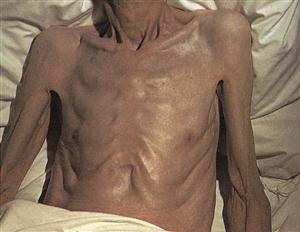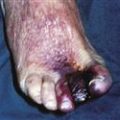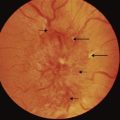Weight Loss
Unintentional weight loss is often a manifestation of significant underlying disease and should never be ignored.
History
General
The timeframe and amount of weight loss should be noted. A dietary history is required to determine the amount and type of food ingested. Decreased dietary intake may result from loss of appetite or loss of interest in eating due to depression. On the other hand, patients with thyrotoxicosis lose weight, despite a voracious appetite.
Enquiries should be undertaken regarding perception of body image, as patients with anorexia nervosa believe that they are overweight, despite being severely underweight. Risk factors for HIV should be screened for and a sexual history as well as information regarding intravenous drug use should be obtained. Systemic enquiry is required to identify features suggestive of malignancy or organ failure in each system to account for unintentional weight loss. A butterfly rash may be present in cases of SLE.
Cardiorespiratory system
Dyspnoea, orthopnoea, paroxysmal nocturnal dyspnoea and peripheral oedema are symptoms suggestive of congestive cardiac failure. With longstanding cardiac failure, cardiac cachexia results from loss of total body fat and lean body mass. Currently, the most common aetiology is end-stage heart failure. Dyspnoea without accompanying orthopnoea or paroxysmal nocturnal dyspnoea suggests respiratory disease. With any chronic respiratory disorder, basal metabolic rate is increased as a result of the increased work of breathing. The presence of haemoptysis may be due to malignancy or TB. A long smoking history is a strong predisposing factor for the development of bronchial carcinoma and COPD. Night sweats and weight loss may be accompanying features of both TB and Hodgkin’s disease.
Gastrointestinal system
Lethargy, diarrhoea, steatorrhoea (p. 431) and abdominal discomfort are various symptoms suggestive of malabsorption. Jaundice, dark urine, pale stools, itching, prolonged bleeding, abdominal swelling from ascites and confusion are symptoms associated with liver disease. Vague abdominal pains, change in bowel habit, tenesmus, blood or mucus mixed with the stools may be due to gastrointestinal malignancy. Patients with helminth infections, such as ascaris, may complain of perianal itching and notice worms in their faeces. Although this is rare in the UK, it may be encountered in patients returning from foreign travel.
Renal system
Lethargy, anorexia, nocturia, oliguria, polyuria, haematuria, frothy urine from proteinuria, skin fragility, pruritus, oedema and bone pains are some of the multisystemic features suggestive of renal disease.
Haematological system
Localised non-tender lymphadenopathy from Hodgkin’s disease may be accompanied by pyrexia and pruritus. Persistent generalised lymphadenopathy, however, is a recognised presenting feature of HIV.
Endocrine system
Polydipsia and polyuria with weight loss may be presenting features of diabetics. Patients with thyrotoxicosis may complain of tremor, staring eyes, heat intolerance, palpitations and diarrhoea. With Addison’s disease, anorexia, malaise, nausea, vomiting, diarrhoea or syncope from postural hypotension may be experienced.
Connective tissue diseases
Arthritis is a very common presentation of connective tissue disease, including rheumatoid arthritis and SLE. Patients may also complain of early morning joint stiffness, lethargy and poor mobility.
Examination
The causes of weight loss are varied. The following specific features identified on examination may be useful in determining an underlying cause.
Inspection
Signs suggestive of endocrine disorder may be obvious; a goitre may be visible with thyrotoxicosis, accompanied by exophthalmos and tremor. Pigmentation of the skin creases and buccal mucosa in a cachectic patient with postural hypotension are the usual findings with Addison’s disease. Jaundice, caput medusae, spider naevi and gynaecomastia may be seen with liver disease. Tachypnoea and pursed-lip breathing may be evident with COPD. Clubbing may be a feature of bronchial carcinoma, suppurative lung disease, cirrhosis and inflammatory bowel disease. The JVP is elevated with congestive cardiac failure. Swelling and deformity of the small joints of the hand may be seen with connective tissue disease. In addition, a rash will frequently be present with SLE.
Palpation and auscultation
Peripheral oedema may be present with cardiac failure, malabsorption, renal and liver disease. Auscultation of the chest may reveal widespread crepitations with pulmonary oedema from cardiac failure, or uniformly decreased breath sounds with COPD. Palpation of the abdomen may reveal hepatomegaly and ascites with liver disease; ascites may also occur with cardiac failure and gastrointestinal malignancies. Lying and standing blood pressure should be measured, as a postural drop is present with Addison’s disease. Joint tenderness is present with connective tissue disease.
General Investigations
■ Urine dipstick
Glucose with diabetes. Protein and blood with renal disorders.
■ FBC
Hb ↓ chronic disease, malabsorption, renal and liver failure and connective tissue disease.
■ ESR and CRP
↑ with malignancy and connective tissue disease.
■ U&Es
Urea and creatinine ↑ renal failure. Na+ ↓ , K+ ↑ and HCO3− ↓ in Addison’s disease.
■ Blood glucose
More than 11.1 mmol/L on two separate occasions indicates diabetes mellitus.
■ LFTs
Bilirubin ↑, transaminases ↑ and albumin ↓ liver failure.
■ Clotting screen
PT ↑ liver failure.
Specific Investigations
■ ANA, RF
ANA raised in SLE and RF increased in rheumatoid arthritis.
■ Faecal fat estimation
↑ with fat malabsorption.
■ Faecal occult blood
Colorectal carcinoma.
■ AXR
Pancreatic calcification with chronic pancreatitis.
■ Joint X-rays
Deformity and erosions with rheumatoid arthritis.
■ Colonoscopy
Colorectal carcinoma, inflammatory bowel disease.
■ Gastroscopy
Gastric carcinoma.
■ US abdomen
Malignancy, small kidneys with renal failure.
■ Short synacthen test
Failure of plasma cortisol to increase with Addison’s disease.
■ Echocardiography
Ventricular impairment with cardiac failure.
■ Stool cultures
Microscopy for helminths and their ova. Helminths may occasionally be visible with the naked eye.





